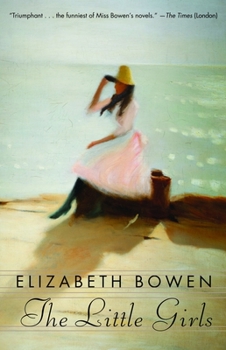The Little Girls
Select Format
Select Condition 
Book Overview
In 1914, three eleven-year-old girls buried a box in a thicket on the coast of England, shortly before World War I sent their lives on divergent paths. Nearly fifty years later, a series of mysteriously-worded classified ads brings the women reluctantly together again. Dinah has grown from a chubby, bossy girl to a beautiful, eccentric widow. The clever, reticent Clare has blossomed into an imperious entrepreneur of independent means. And Sheila--who was once the pretty princess of her small universe--has weathered disappointed aspirations to become a chic and glossily correct housewife. As these radically different women confront one another and their shared secrets, the hard-won complacencies of their present selves are irrevocably shattered. In a novel as subtle and compelling as a mystery, Elizabeth Bowen explores the buried revelations--and the dangers--that attend the summoning up of childhood and the long-concealed scars of the past.
Format:Paperback
Language:English
ISBN:1400034795
ISBN13:9781400034796
Release Date:July 2004
Publisher:Anchor Books
Length:320 Pages
Weight:0.57 lbs.
Dimensions:0.7" x 5.2" x 8.0"
Customer Reviews
1 rating
Anti Nostolgic Reaquaintence
Published by Thriftbooks.com User , 19 years ago
Elizabeth Bowen became one of my favorite authors ever within the first chapter of the first book of hers that I read, (The House in Paris). Her text is acute and moving, it makes everyone alive and has a tangible respect of the subjectivity of people's existence. The Little Girls, the fourth novel of hers I have read. I do not think I would have fallen as madly in love with her if it had been my first or second book of hers that I read. But it is still a good novel. Like most of Bowen' work plot is secondary to the way people read one another. In this case the three girls of the title, who are all grown up and in their sixties. They have not spoken to each other since their childhood effectively ended with the outbreak of the First World War. The girls put together a pagan sort of made up ritual in creating a time capsule to go along with their exotic nick-names, (Sheickie, Mumbo and Dicey). Then fifty years later they decide to search for it. But really it is about After reflection the prose of this seems different than in her earlier novels. I read an article that stated in her later novels, especially Eva Trout, her prose tends to be more in the subjectivity of the characters. The Little Girls is definitely moving in that direction. The third person narrator is using the vocabulary of whom she is describing. This is especially obvious in the second section narrating the events that happened immediately before the outbreak of the war. It makes it less sympathetic than the prose of her earlier novels. I guess I just wanted to like it more than I did.






